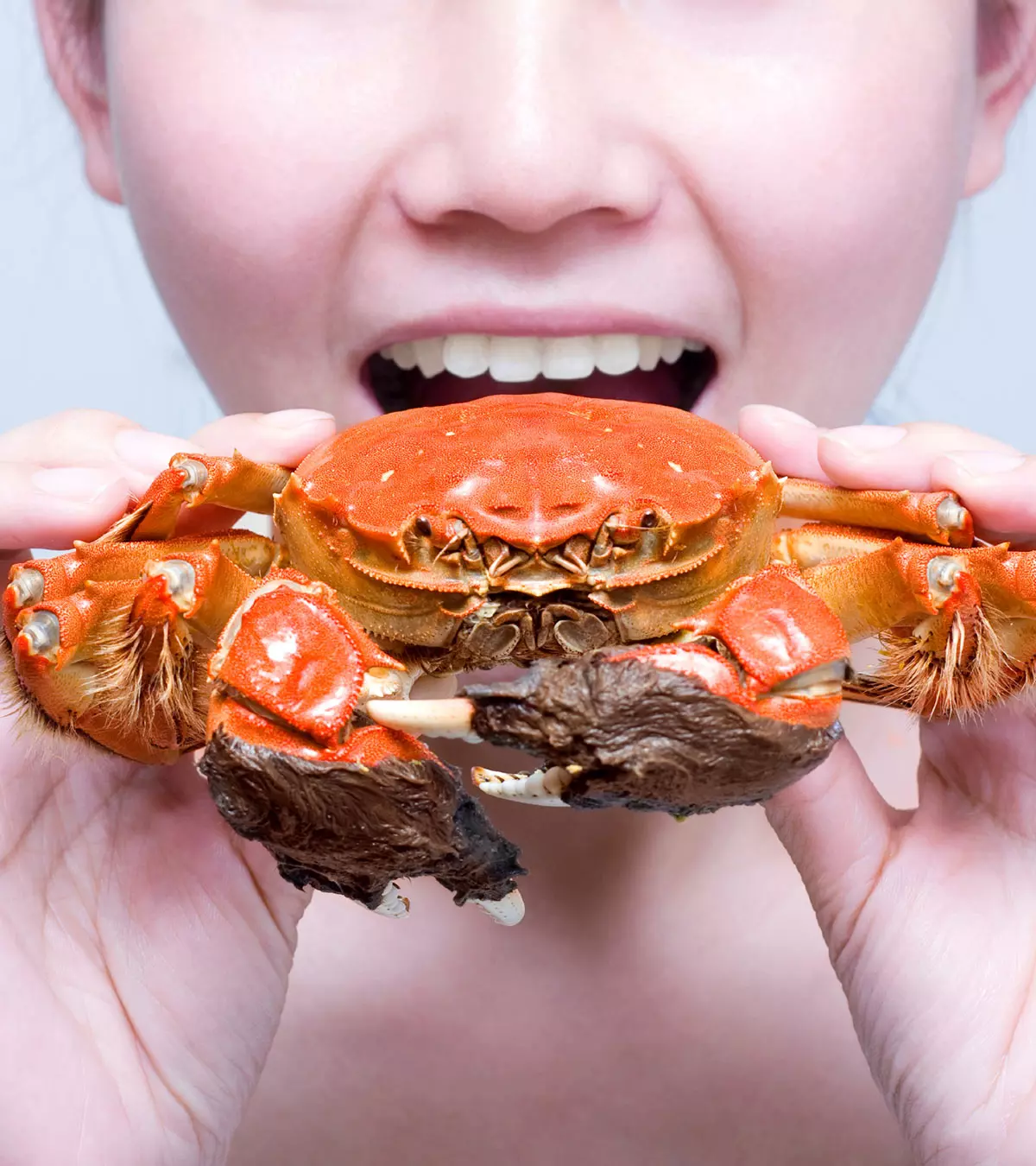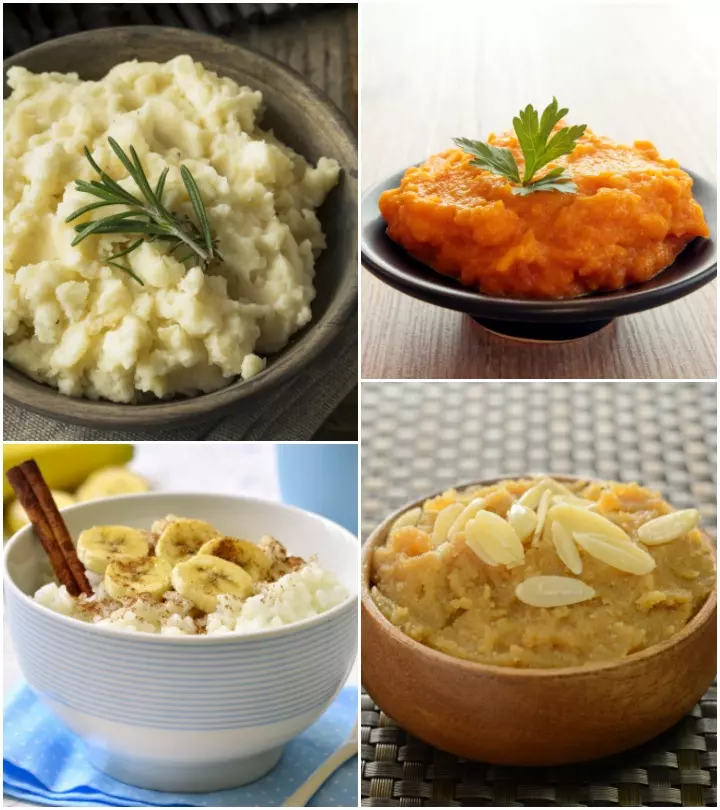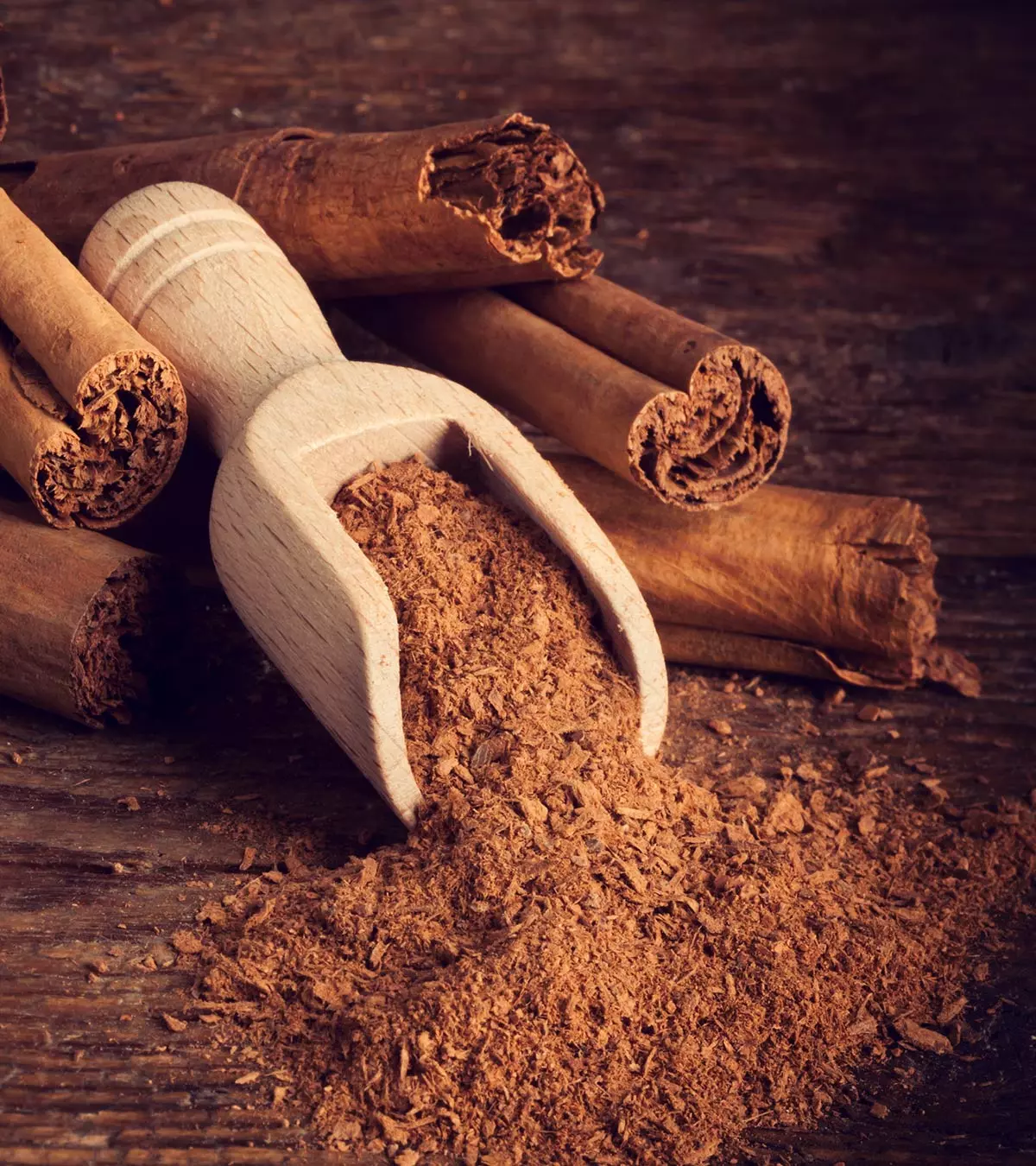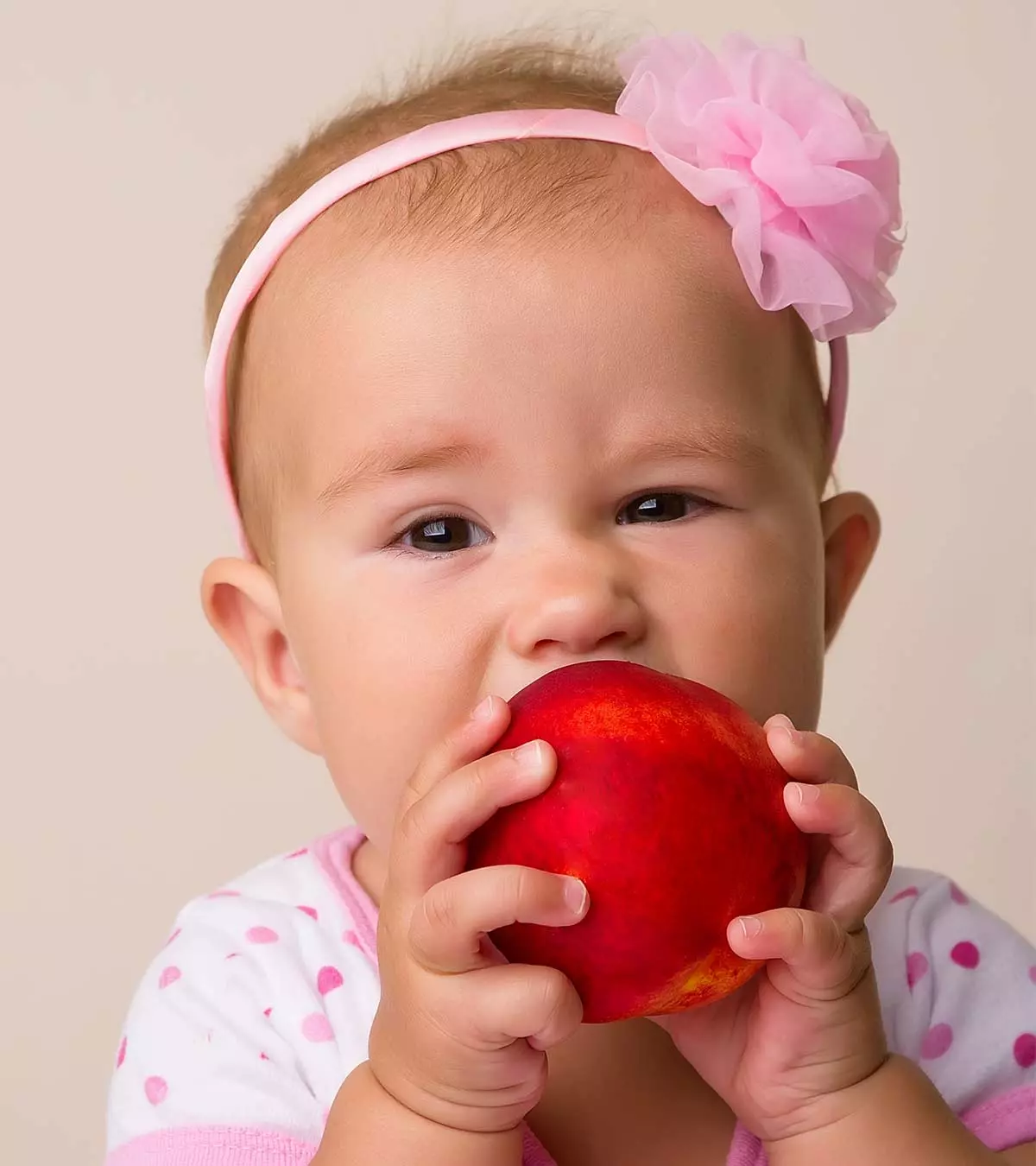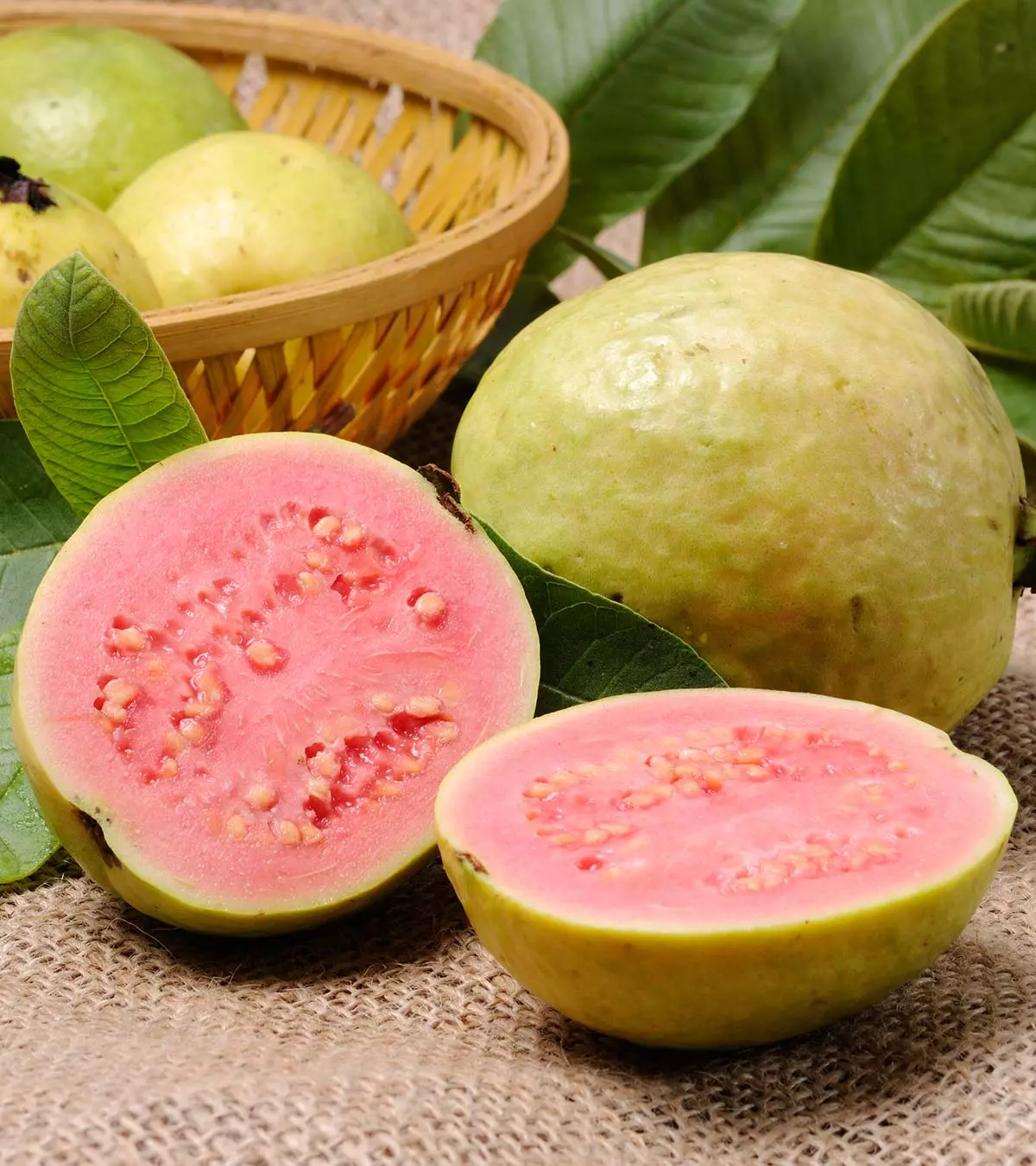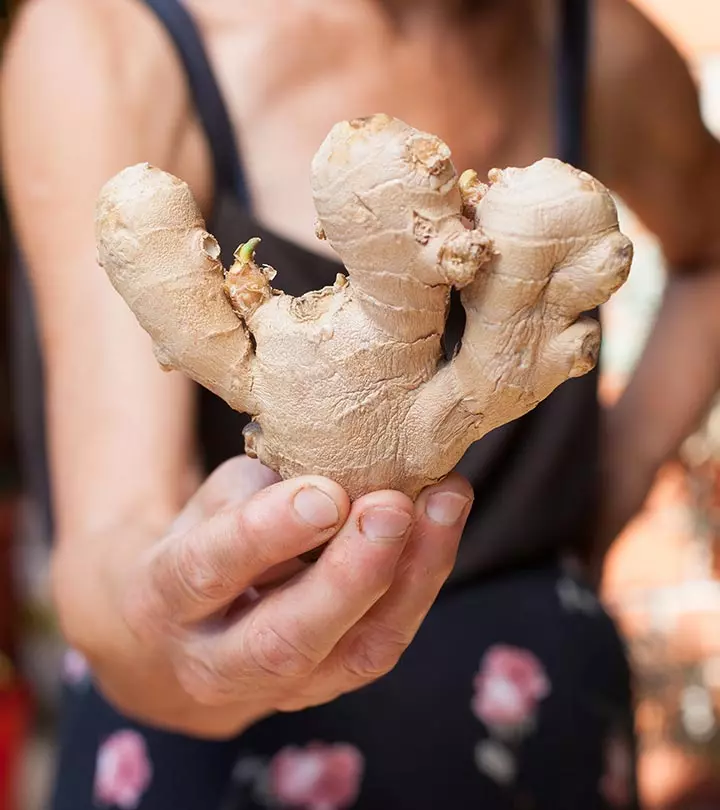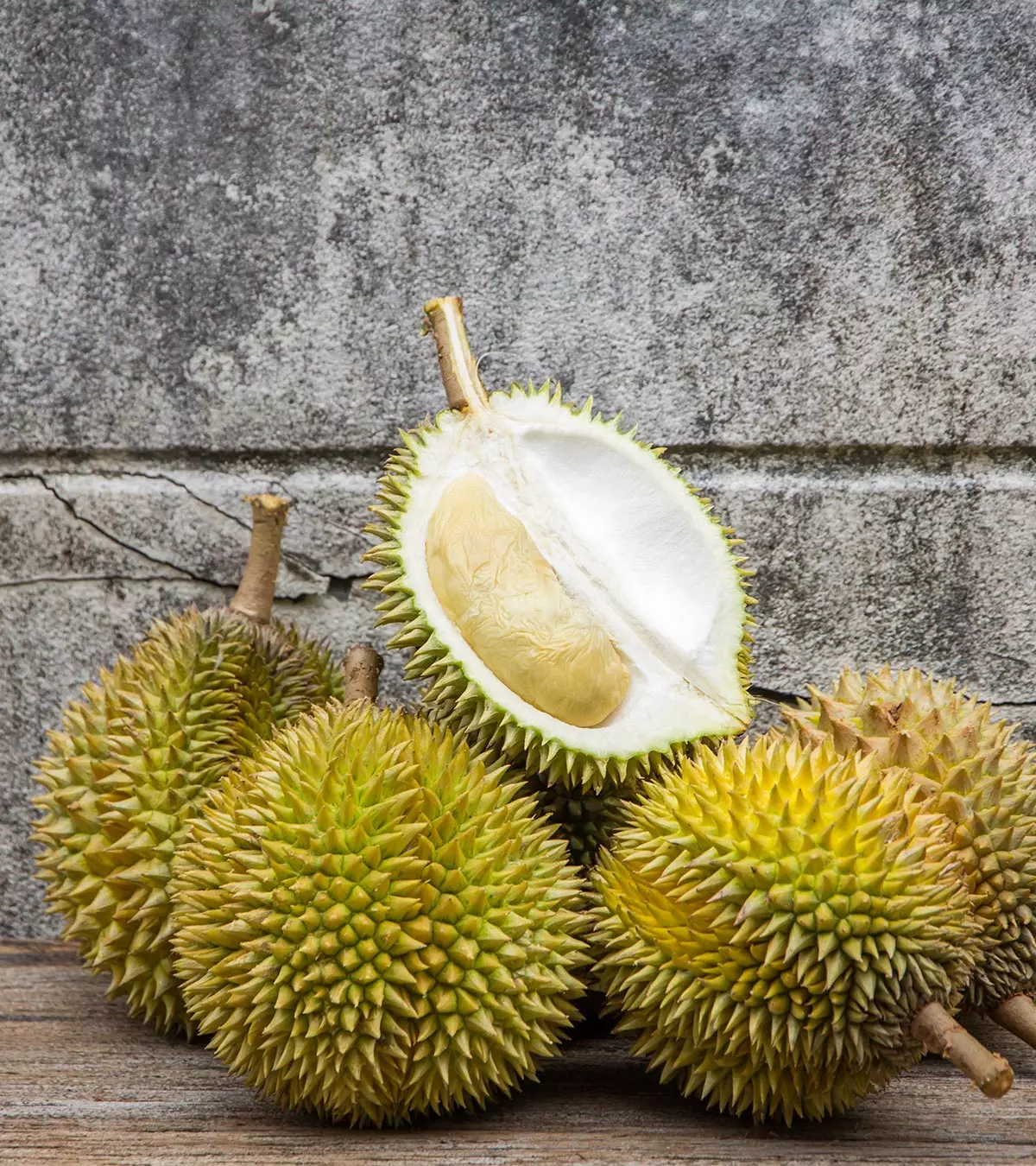
Image: ShutterStock
Your baby will turn 14 months old in a few days, and you suddenly notice that they begin to show disinterest in foods they loved earlier, leaving you wondering about some food ideas for 14 months baby that could help give the required nourishment to your little one. Until the one-year mark, your baby’s nutritional needs are fulfilled by the mother’s milk or formula. Nonetheless, as they cross this mark and enter toddlerhood, their dietary needs increase substantially.

With most toddlers turning fussy eaters by the 14th month, it becomes hard for parents to comprehend and select the foods to be given to their children to fulfill their growing nutritional demands. Plunge into this post as we present you with some easy yet super healthy food ideas to feed your selective 14-month-old. However, ensure to feed with a safe baby fork that is convenient and reduces the risk of scratching from the usual fork.
Read on to find out about 14 month old baby food:
Key Pointers
- 14-month-old babies have increased nutritional needs beyond formula or breastmilk.
- Good foods for a 14-month-old’s diet include grains, fruits, vegetables, juice, milk, eggs, beans, cheese, lean meat, and breast milk.
- Encourage children to eat more vegetables by serving creative vegetable dishes.
- Toddlers should have limited serving sizes of 100% juice and full-fat milk.
Meal Planning Tips
14-month-olds are at a phase of transitioning to more solid foods, though they may still be breastfeeding or drinking formula. Here are a few tips to ensure a smooth transition.
- Include a good mix of proteins, whole grains, colorful vegetables, and fruits of different flavors and textures in balanced portions.
- Ensure food is well cooked and cut so that it is easy to be picked up with their hands.
- Offer dips and spreads made from nuts, legumes, yogurt, vegetables, and fruits to make the meal more wholesome.
- Establish regular meal and snack times to create a routine. Do not replace meals with liquids like milk if the child refuses to eat.
- Have options for the child to choose from, and avoid coercing the child into eating what they don’t like.
- Ensure they drink plenty of water throughout the day. Avoid sugary drinks, caffeinated beverages, sodas, and fast foods.
- Offer unsweetened fresh fruit juices, soups, yogurt smoothies, tender coconut water, and animal or plant-based milk to drink.
- Be mindful of potential allergies and avoid including them. Introduce new foods one at a time and watch for any reactions.
- Eat together whenever possible and let them see you enjoying a variety of healthy foods.
Top Food Ideas For A 14-Month-Old Baby
1. Grains
Grains must make up a significant portion of a 14-month-old child
. You can choose whole grains like oatmeal, whole wheat bread, and brown rice for babies, or serve your child a serving of vegetable pasta. You can also sneak in some wholesome food while preparing the dish. Try to incorporate at least one serving (one serving for a baby is one-quarter of an adult’s serving) of grain into your baby’s diet. A strong addition to the 14 month old baby food plan.
 Nutrition fact
Nutrition fact2. Fruits

Tasty and sumptuous fruits will make great add- ons to any meal. They are a source of several nutrients that your toddler will need for the day. You must try to include one serving of fruit at each meal. One serving of fruit for a toddler is equal to 1/4th cup of fruit. Cut a ripe fruit into small pieces and serve to your baby. You may also consider making fruit jams and purees as a dip for various foods. Further, fruits may also be added to salads, oatmeal, pancakes, smoothies, and flavored yogurt.
3. Vegetables
Colorful vegetables will make a healthy addition to your toddler’s diet. Do not serve raw veggies to your baby. Steam the vegetables until tender and cut them into small pieces to prevent choking. According to the American Academy of Pediatrics (AAP), over half of the choking episodes in children occur due to food. So ensure to prepare veggies in age-appropriate forms. Season them with minimal salt and pepper and serve. Include at least one vitamin-C-rich veggie in your baby’s diet. Veggie sticks can also help soothe a baby’s teething pain.
 Quick tip
Quick tip4. Juice
Juices are an interesting addition to your toddler’s healthy diet regimen. If you are thinking of serving juice to your baby, then choose 100% juice to avoid preservatives and added sugar. Limit the serving to not more than 6 ounces a day.
5. Milk
Milk should make up most of your 14th-month-old and is the most commonly used dairy product for kids. A ½ cup of milk equals to one serving. Choose full-fat milk for your toddler. Limit the milk intake to not more than 16 ounces a day.
6. Egg

Eggs, with its high protein, iron, choline, vitamin B12 and folate, will make perfect food for toddlers. Scrambled eggs with veggies is among the quick egg recipes for toddlers. Or mash the boiled egg with a fork and sprinkle some grated cheese over it.
7. Beans
Beans are an excellent substitute for meats at meals.
You can serve beans with vitamin c rich fruits and vegetables to increase the absorption of iron in your little one’s body. Make sure you chop or mash the beans into bite-sized pieces. Always serve well cooked beans.
 Point to consider
Point to consider8. Cheese
Cheese is one food that kids of all ages love. Add grated cheese to vegetables, eggs or beans to round a meal. Apart from being an excellent source of protein, cheese also contains calcium and protein, nutrients that are critical for a growing child.
9. Lean Meat
Choose lean sources of meat like poultry or fish for your 14-month-old. A serving of meat for a 14-month-old should consist of 1 ounce of meat. Do not serve him more than the recommended amount as protein sources should make the smallest portion of your child’s daily diet.The 14 months baby food is extremely delicious with lean meat!
10. Breastmilk

If your baby continues to breastfeed, then it is good news for you. Breast milk will provide him with all the calories, enzymes, vitamins and valuable immunities. Breastfed toddlers get sick less often, and nursing will also create a strong bond between you and your baby.
Frequently Asked Questions
1. What should a 14-month-old eat for breakfast?
Given below is an AAP-approved sample breakfast menu that you can make for your child (1):
- ½ cup of sliced bananas
- ½ cup whole or 2% milk
- Iron-rich foods like ½ cup iron-fortified breakfast cereal or one cooked egg
- 2-3 large sliced strawberries
2. How many meals does a 14-month-old need?
A baby older than 12 months needs about 1000 calories a day which should be divided among three meals and two snacks throughout the day (2).
3. What can I give my 14-month-old for lunch?
Given below is an AAP-approved sample lunch menu that you can make for your child (1):
- ½ sandwich with tuna, salad, chicken, or peanut butter filling
- ½ cup whole or 2% milk
- ½ cup cooked green vegetables
4. How much whole milk should a 14-month-old drink?
As suggested by the AAP, babies between the age of 12-24 months should consume about 2 to 3 cups of milk per day (3).
5. What are some good finger food ideas for a 14-month-old baby?
Well-cooked and soft zucchini, bite-sized pieces of ripe banana, well-cooked pasta, and small pieces of soft and tender chicken are some good finger foods for a 14-month-old baby (7).
6. What foods should be avoided for a 14-month-old baby?
Avoid feeding foods that contain high amounts of added sugar and sodium. Foods that pose a choking threat, such as hot dogs, raw vegetables and fruits, nuts and popcorn should not be included in the baby’s diet. Refrain from giving unpasteurized fluids and cheese to avoid adverse outcomes (8).
7. Can a 14-month-old baby have cow’s milk?
Yes, you can introduce cow’s milk for babies older than twelve months. Refrain from feeding cow’s milk to babies younger than one year as it is nutritionally inadequate to meet the baby’s needs (9).
8. Are there any specific nutrients that a 14-month-old baby needs more?
As per dietary recommendations, a toddler should have 700 milligrams of calcium, 600 IU of vitamin D, and 7 milligrams of iron each day. Toddlers need around 1000-1400 calories per day (10). If you think they are not getting sufficient iron, you may consult your doctor and look for alternatives like baby-friendly iron supplements.
9. Is it normal for a 14-month-old baby to be a picky eater?
As they grow, they develop food preferences and their choice may vary with each passing day. They may refuse to eat and try new foods. Offering various choices and incorporating various foods can help maintain a balanced diet (11).
10. What are some common food allergies that a 14-month-old baby might have?
Substances that commonly cause allergies in children include shellfish, milk, soy, peanuts, eggs, and wheat (12).
Do not be discouraged if your 14-month-old rejects specific foods. Remember that a toddler’s palate is not the same as an adult’s. Therefore, they may not be interested in certain flavors and food textures. To understand their food preferences and what kinds of food are best for them, you may try the 14-month-old baby food ideas recommended in this article. Further, always introduce a new food in smaller proportions and do not force them to finish what’s on the plate. Allow your toddler to choose their preferred foods, and focus on serving variety, not just increasing their portion sizes.
Infographic: Nutrient-Rich Foods To Include To A 14-Month-Old’s Diet
Children between the ages of one and two years need adequate calorie intake to sustain through an active day. When transitioning from pureed solids to table food, children can be introduced to a variety of eatables, fruits, and vegetables. The following infographic contains a few food ideas for your 14-Month-Old.
Some thing wrong with infographic shortcode. please verify shortcode syntaxIllustration: Top 10 Ideas For 14 Month Old Baby Food

Image: Dall·E/MomJunction Design Team
References
- Sample Menu For A One-Year-Old; Healthy Children.
https://www.healthychildren.org/English/ages-stages/baby/feeding-nutrition/Pages/Sample-One-Day-Menu-for-a-One-Year-Old.aspx - Feeding And Nutrition Tips: Your One-Year-Old; Healthy Children.
https://www.healthychildren.org/English/ages-stages/toddler/nutrition/Pages/Feeding-and-Nutrition-Your-One-Year-Old.aspx - Recommended Drinks for Children Age 5 & Younger; Healthy Children.
https://www.healthychildren.org/English/healthy-living/nutrition/Pages/Recommended-Drinks-for-Young-Children-Ages-0-5.aspx - Grains.
https://www.healthyeating.org/nutrition-topics/general/food-groups/grains - Tips to Help Kids Enjoy Fruits and Veggies.
https://www.eatright.org/food/planning/meals-and-snacks/get-fruits-and-veggies-to-the-plate - All About Beans Nutrition, Health Benefits, Preparation and Use in Menus.
https://www.ndsu.edu/agriculture/extension/publications/all-about-beans-nutrition-health-benefits-preparation-and-use-menus - Finger Foods for Babies
https://kidshealth.org/en/parents/finger-foods.html - Feeding Your 1- to 2-Year-Old
https://kidshealth.org/en/parents/feed12yr.html - Cow’s Milk and Milk Alternatives
https://www.cdc.gov/infant-toddler-nutrition/foods-and-drinks/cows-milk-and-milk-alternatives.html?CDC_AAref_Val=https://www.cdc.gov/nutrition/infantandtoddlernutrition/foods-and-drinks/cows-milk-and-milk-alternatives.html - Nutrition Guide for Toddlers
https://kidshealth.org/en/parents/toddler-food.html - 10 Tips for Parents of Picky Eaters
https://www.healthychildren.org/English/ages-stages/toddler/nutrition/Pages/Picky-Eaters.aspx - Diagnosing Allergies in Children
https://acaai.org/allergies/testing-diagnosis/for-children-and-infants/
Community Experiences
Join the conversation and become a part of our nurturing community! Share your stories, experiences, and insights to connect with fellow parents.
Read full bio of Jyoti Benjamin
Read full bio of Jessica Albert
Read full bio of Swati Patwal
Read full bio of Vidya Tadapatri






